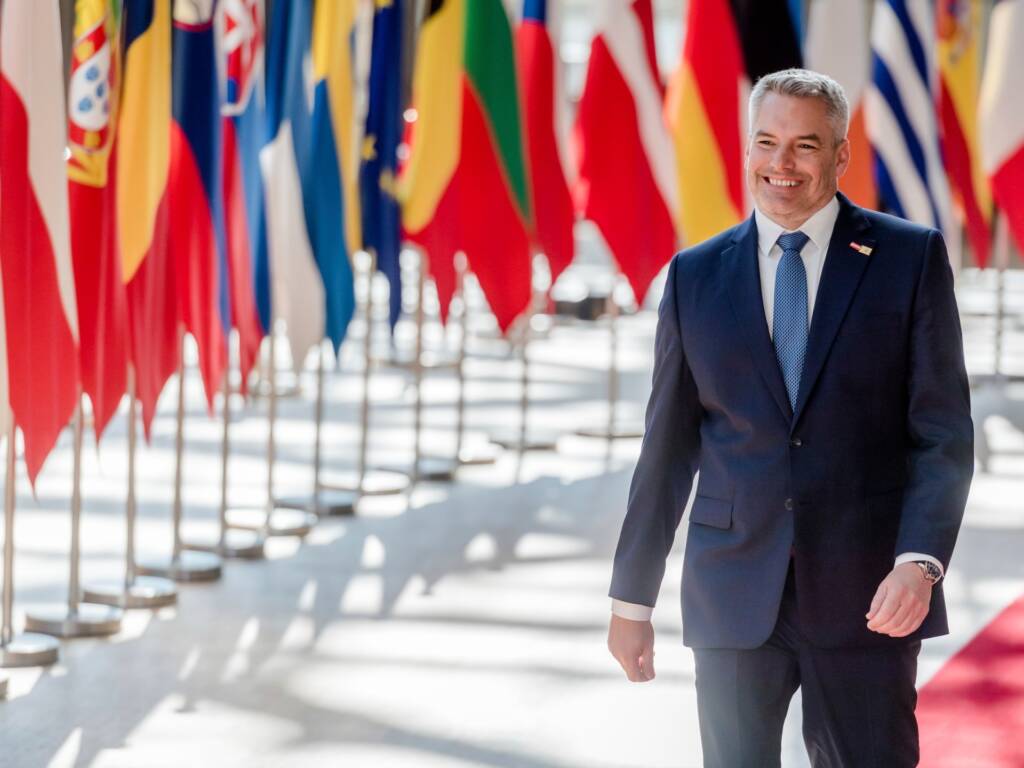Ireland is Neutral. Switzerland is Neutraler and Austria is the Neutralest. Sorry about the bad grammar but Austria’s neutrality is gladdening the Kremlin and giving the west a heartache.
Austria’s response to the Ukrainian crisis encapsulates a complex strategy that combines humanitarian aid and political support for Ukraine with a pragmatic approach to its economic and energy needs. Austria has demonstrated a strong commitment to assisting Ukraine in the face of the war by providing substantial humanitarian aid, welcoming refugees, endorsing European Union (EU) sanctions against Russia, and publicly denouncing President Putin.
Join us on Telegram: https://t.me/tfiglobal
Despite this outward support for Ukraine, Austria has maintained robust commercial relationships with Russia, particularly in the sectors of energy and finance.
The visit of Austrian Chancellor Karl Nehammer to Moscow, purportedly a peace mission, occurred while Austria continued to receive Russian gas supplies, in stark contrast to Germany, which experienced a cessation of such supplies. Austria’s nuanced stance is evident in its energy policies. Despite its support for the EU’s stance against Russia, Austria has significantly increased its dependence on Russian gas. As of December 2023, 98% of Austria’s gas imports originated from Russia, making it a critical component of the country’s energy supply and underscoring its strategic importance for 22% of Austrian households reliant on Russian natural gas for heating. In 2022, the value of Austria’s gas imports from Russia amounted to approximately €7 billion.
Read More: Russia is making a bonfire out of Pricey NATO Weapons
Criticism has been directed towards Austria for its continued financial engagement with Russia through gas purchases, with EU envoy Martin Selmayr highlighting how such transactions indirectly finance Russia’s military efforts. The EU has set a goal to phase out Russian gas by 2028, yet Austria has not made any efforts towards diversifying its energy sources or reducing its reliance on Russian gas.
Recently, Austrian MEP Harald Vilimsky, from the Freedom Party of Austria (FPÖ), expressed reservations about the concept of an EU army during the first official discussion on the matter. Vilimsky emphasized the potential risks to national sovereignty and the complexities of integrating such a force within the existing NATO framework.
And now Austria has articulated its stance on the ongoing conflict between the West and Russia, emphasizing the importance of maintaining diplomatic dialogue amidst escalating tensions. Austrian Foreign Minister Alexander Schallenberg, in an interview with ORF television, underscored the necessity for channels of communication between Vienna and Moscow. He advocated for a nuanced approach to international relations, highlighting the complexity of the global landscape that defies simplistic, binary interpretations.
Despite the openness to dialogue, Schallenberg expressed skepticism regarding the feasibility of traditional bilateral discussions under the current circumstances, particularly concerning the crisis in Ukraine.
In a significant development reported by Austrian media, a meeting between Schallenberg and Russian Foreign Minister Sergey Lavrov took place in Skopje, North Macedonia, prompted by the Organization for Security and Co-operation in Europe (OSCE). This encounter, focusing on the appointment of senior officials within the OSCE, indicates ongoing efforts to sustain diplomatic engagement, even as broader geopolitical relations remain strained.
Read More: Putin’s Success, West’s Envy, Watchers’ Delight
Amid discussions on military involvement in Ukraine, Austria has reaffirmed its commitment to neutrality. Schallenberg explicitly rejected the notion of Austrian military support to Ukraine, whether in the form of troop deployments or the provision of arms and equipment. This position aligns with Austria’s long-standing policy of neutrality and its reluctance to escalate military commitments.
The broader international community, including NATO, appears to be in a state of indecision regarding direct military intervention in Ukraine. French President Emmanuel Macron’s remarks following a meeting in Paris, attended by representatives from approximately 20 Western nations, highlighted the ongoing deliberations over potential military assistance to Kiev. Although no consensus was reached, the possibility of future troop deployments to Ukraine remains open.
